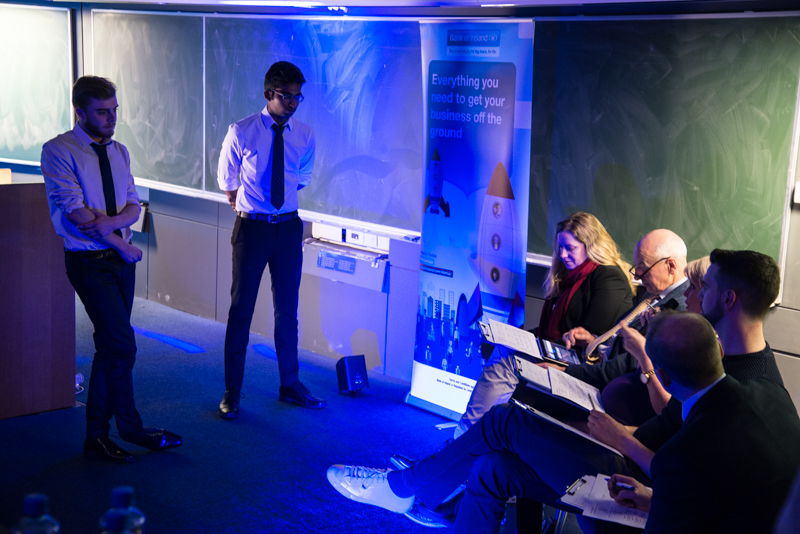We’ve heard it all before. Trinity is the best university in Europe for graduates founding venture-backed companies. The Provost wants every student to be an entrepreneur. Trinity wants to merge its launchpads and Lauchboxes into one innovation hub. Rightly or wrongly, there seems to be something about Trinity talking about it’s own entrepreneurial achievements and ambition that makes most students’ eyes roll.
But get those students into a room and their power to create what could become household names becomes more than clear, and their enthusiasm perhaps even more so. With this year’s event seeing the prize money on offer more than triple, from €3,000 to €10,000, students’ pitches last night proved the wealth of entrepreneurial talent on campus – and the hunger of those that have it to see their business succeed.
Indeed, the night’s winners, Auris, were praised for preparing to disrupt the market and take on some of the world’s best-known manufacturers with their revolutionary hearing aid. Citing the fact that a hearing aid can cost up to €4,500 in its four to five year lifespan, they claimed they could offer an 86 per cent discount compared to Specsavers and would seek to enter the market through insurance companies, private retailers or bodies like the NHS. While encouraged by judges to look outside of Ireland’s small market, the team was praised for their preparation for hard questions, taking home €7,500 in prize money.
The judging panel was an impressive one, made up of Thomas Buttle of Bank of Ireland; Jamie White, Founder of Leading Social; Mary Mitchell O’Connor, Minister of Jobs, Enterprise and Innovation; Bobby Kerr, Chairman Insomnia Coffee and former dragon on RTÉ’s Dragons Den; and Fionnuala Healy from Trinity Research & Innovation.
The night kicked off with Ticket Chain, aimed at tackling head-on the problems caused by ticket touting and its effects on customers. Citing the statistic that one in 12 in Ireland have experienced some sort of ticket fraud, something which can cause customers to end up paying far above market price, or purchase fake tickets, the team explained that Ticket Chain allows an event host or venue to host their own primary and secondary markets, enforcing their own resale price restrictions.
With concerns raised over the exclusive deals that many Irish venues have with companies like Ticketmaster, the team explained that they would start with groups like Trinity Ents and move into the market, charging €1.50 per ticket sale, or resale, and aiming to keep the event-going experience positive: “When we’re making noise, they’ll hear us.”
Ticket Chain were the runner-ups of the night, receiving €2,500 in prize money. With the secondary market for tickets currently valued at €8 billion, and tickets for upcoming gigs like Stormzy selling way above market price, O’Connor commented that the issue was “very current”, and Kerr praising the idea as a “massive opportunity” to disrupt the market.

Next was Neurobranch, a cloud-based bio-research study platform that allows researchers to interact with participants with human trials while lowering the dropout rate and reducing the effects of human error. Having spoken with Trinity researchers, the team stated that they were responding to the current “archaic” system.
Zorin group, ran by two brothers, presented their latest product after introducing their powerful yet simple-to-use operating system, Zorin OS, which already has 16 million downloads. Their new product, Zorin Micro, is a new computer that can run off any screen. Costing just $75, the computer is targeted at “the next few billion” in the developing world, and is preloaded with educational content as well as information on everything from farming to finance for areas with weak internet. Also aiming to provide a platform for people to make their own income, the product was presented as one that would “give the next few billion access to the sum of all human knowledge”.
Inspired by her mom’s search for a handyman, the next presenter explained HANDI, which connects users with “skilled and reliable handyman” through a similar platform as companies like Uber. Seeking to “revolutionise the tradesman industry in Ireland”, the app would take a cut from each job, rather than take a joining fee. While White stated that he often saw young people latch onto their first idea without having any real love for it, he seemed satisfied by the response that the idea was not only interesting, but necessary.
In what was perhaps the night’s most entertaining discussion, Foxteal, a dating app that seeks to connect users not only through attraction but on a mutual interest in activities, was the last company to present. Stating that currently only one in 10,000 Tinder swipes result in dates, the team are targeting 18 to 25 year olds, and have been downloaded 200 times, 100 in the last week alone. While the team explained that they’re currently partnering with Groupon for the activities they offer, Kerr joked that he knew exactly what kind of activity he would use it for, much to the delight of the crowd.
With a confident showing of hands when the room was asked who would download the app, the evening proved the strength of student-led companies, and the enthusiasm of those behind them.







